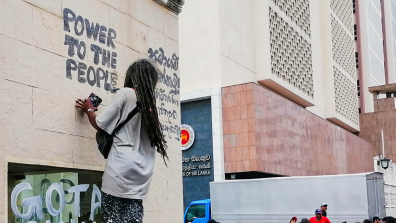If we love fashion, we have to talk about the garment workers
Another year, another London Fashion Week, and once again the designers and their ‘cutting-edge’ collections have eclipsed any mention of the grim reality facing the people who make our clothes.
Right now in sweatshops across the world, millions of garment workers, mainly women, struggle to survive on poverty wages, and provide for their children. They are forced to work 14 hour days in appalling conditions.
As a woman who loves clothes and works in solidarity with garment workers overseas, it’s hard not to be reminded of their misery getting dressed every morning.
I have just returned from Sri Lanka, where I met a Disna. She has been working in garment factories all her life. On the day of her accident, her boss told her she was not to take her usual place at the sewing machine. Instead, she was ordered to operate the notoriously dangerous button machine: a large steel contraption which operates by rapidly punching buttons onto clothing.
Without warning the machined punched down onto her finger, crushing her hand and attaching a button to her index finger. She can longer use her right arm and hand, and the factory and clothing brand refuse to pay her compensation. She was making clothes for the UK high street.
The fast fashion industry is inherently, and inextricably exploitative. It’s not about one brand being bad and another one less so. In this highly competitive industry, the inevitable race to the bottom means poor working conditions and poverty pay for the people who produce our clothes.
It’s almost three years now since the deadly Rana Plaza collapse that killed over 1,100 garment workers. The building housed factories making clothes for Benetton, Primark, Matalan, Mango and other major brands supplying clothes for the UK high street. Only recently did the Rana Plaza Donors Trust Fund meet its target of $30 million, meaning long awaited compensation for victims and their families. Yet, the fight for justice goes on.
On a recent visit to Bangladesh I met with female garment workers who are determined to form unions in their factories, aware that their right to negotiate collectively for better working conditions and wages is the best chance they have to support themselves and their families.
When I asked about the risks they faced in forming unions, one worker, Alia, explained that it was routine to be verbally and physically harassed by gangs of men employed by factories to intimidate women as they walk home at night following their shift. Alia and the other women showed me their bruises. They told me they were used to it: they knew the risks.
None of this happens by accident; Disna’s hand being crushed at work, Alia’s subjection to violence and intimidation. So long as we expect companies to be motivated to act based on a moral imperative, we will be left waiting. Self-regulation of the industry has failed.
There are existing national and international laws meant to protect workers rights’ but too often they’re not enforced. Flouting them, rather than following them is the norm. Armed with absolute impunity, clothing companies continue to rake in the profits on the back of exploited garment workers around the world.
Lasting change can only be achieved through international, enforceable regulation that protects the rights of workers supplying the UK high street. It is time the government regulated the business practices of UK retailers to ensure that overseas workers are guaranteed a living wage, decent safe working conditions and the right to join a trade union.
In the way that international public pressure led to the historic Bangladesh Safety Accord following the Rana Plaza collapse, we must apply pressure to end the injustice of sweatshops, and stand alongside garment workers fighting for their dignity at work.
Thulsi Narayanasamy is Senior International Programme Officer (Sweatshops & Plantations) at War on Want.



